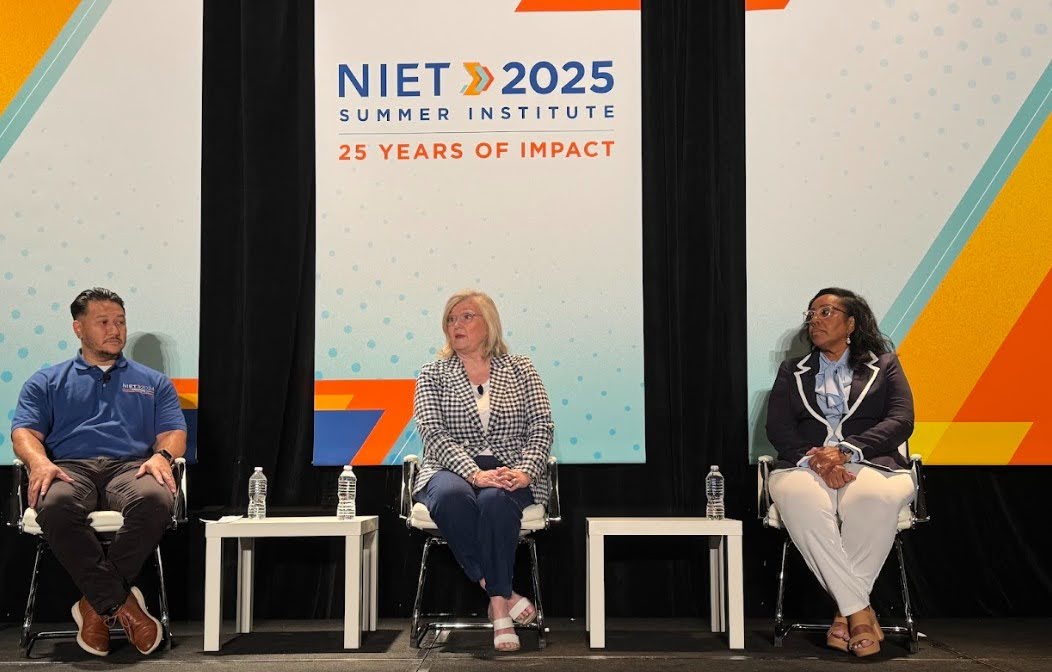3 Insights from 3 Levels of Leaders: Strategic Reflections from NIET Summer Institute
July 3, 2025

When it comes to educator work behind the scenes, the tables at NIET’s Summer Institute (NSI) speak for themselves: School plans on sticky notes, student data, and binders brimming with next steps are strewn throughout the rooms, a testament to the enduring passion of more than 500 educators nationwide. Every year, NSI brings together leadership teams and teachers to plan for their upcoming school year, setting the tone and establishing the strategies to help them reach the finish line before the “race” even begins.
A standout moment during this year’s NSI was the opening morning panel discussion, moderated by NIET CEO Dr. Joshua Barnett, covering reflections and strategies on collaboration, combating teacher retention, and leader development, featuring a trio of speakers:
- Arkansas’ Assistant Commissioner of Educator Effectiveness & Licensure Karli Saracini,
- Louisiana’s Ascension Public Schools Instructional Supervisor Dr. Latatia Johnson, and
- Texas’ Somerset Independent School District Executive Master Teacher William Mock
The three panelists offered a comprehensive and layered perspective on hot education topics, providing insights from the state, district, and classroom leadership levels.
Saracini shared insights related to Arkansas’ investment in leadership capacity, spearheaded through partnerships, including that with NIET. Increases to teacher compensation, merit-based pay implementations, and lead teacher designations have all been ways Arkansas has combated the challenge of teacher retention, she shared.
“Retention is our new recruitment in Arkansas,” Saracini said in her responses, prompting interest from the audience. “We began to look at what we can do to incentivize teachers to stay in the classroom, because we all know that teachers leave because they do not have support. So, Arkansas has tried to take that lead and flipped our leadership, making sure we’re doing all we need to do through providing resources and building capacity.”
Retention is our new recruitment in Arkansas.Karli Saracini, Assistant Commissioner of Educator Effectiveness and Licensure, Arkansas Department of Education
Dr. Johnson reflected on how her district has created actionable change through working together, identifying causes that prevent educators from staying in the profession, and establishing effective professional development opportunities to drive leadership among schools.
"At the system level, we've been working with our leaders to identify those barriers that are causing teachers to leave. We are supporting them in their actions and their culture. When you have a culture of collaboration, that’s when you're able to truly provide that ongoing support, allow those teachers to thrive, give them a voice at the table," Dr. Johnson said. “Thinking about the Three C’s has been very powerful for me as a system leader working to make an impact. One: Collaboration, rooted in evidence. Two: System coherence, rooted in shared leadership. And three: Capacity building, rooted in results. When you go back to your buildings, think about how you, as system leaders, are unpacking those three C's to have impact."
The Three C’s have been very powerful for me as a system leader working to make an impact: collaboration, coherence, and capacity.Dr. Latatia Johnson, Instructional Supervisor, Ascension Public Schools, Louisiana
Mock, who was also a 2024 NIET Fellow, carried the discussion to the level of classroom support and teacher leaders’ role in growing and retaining educators. He included proven strategies that worked for his team in Texas, such as co-teaching with educators, modeling instructional practices, and pushing his colleagues out of their comfort zones. For Mock, he shared that growth begins with a mindset.
"Start with belief,” Mock told the audience. “Believe that your teachers and your students are capable of so much more. We want to make sure we’re building that capacity for everybody. Try to unlock that potential that they have to grow them into the people that they are capable of becoming."
Start with belief. Believe that your teachers and your students are capable of so much more.William Mock, Executive Master Teacher, Somerset Independent School District, Texas
The opening panel on strategies for retention and educator growth lent itself to the greater focal point of many of the sessions: How reflective practices elevate every level of leadership team in a school system and equip them with the tools and resources needed for success.
Increasing Coaching Effectiveness Through Reflective Practice, Leader Reflection as the Key to Maximizing Cluster Impact, and Strengthening the ILT Through Leader Reflection and Learning sessions all challenged leaders at different levels of school systems to consider how reflective practices can elevate their success. Decisions rooted in observation, data, and steps for effective learning don’t just launch a successful school year - they also sustain it, and create the possible elements to reach and exceed goals - from the classroom to the district level and beyond.
*Panelist responses have been edited for clarity